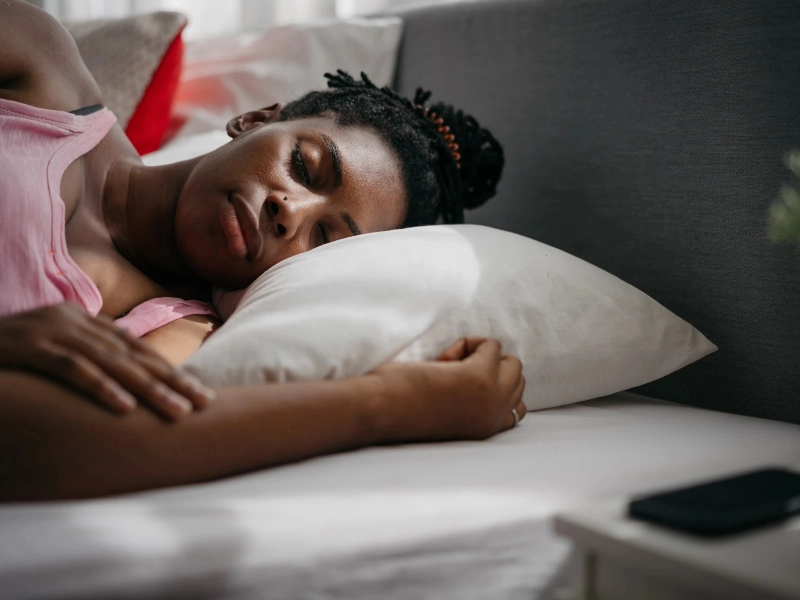7. Alternatives to the Soap Trick: Other Unconventional Sleep Aids

Advertisement
Although the soap trick has become well-known as an odd sleep aid, it is most likely not the only weird technique individuals have tried in search of better sleep. If you're interested in investigating alternate techniques to enhancing your sleep quality, here are few other unorthodox sleep remedies that have attracted attention:
1.Some people swear by having tea made from boiling banana peels before bed. Banana peels' high concentrations of magnesium and potassium, according to supporters, aid induce relaxation and improved sleep. Although there is little scientific data to back up this, bananas are well-known to have nutrients that help with sleep.
2.Tart cherry juice's high melatonin level has drawn interest as a natural sleep aid. Particularly in elderly persons with insomnia, some research have indicated that drinking tart cherry juice before bed may help extend and enhance quality of sleep.
3. Usually weighing between five and thirty pounds, weighted blankets are meant to deliver mild, continuous pressure across the body. Many consumers of weighted blankets say they feel more at ease and have better quality of sleep. Certain studies show their efficacy, especially for those with sensory processing problems or anxiety.
4.Autonomous Sensory Meridian reaction, or ASM, Video: ASM is the tingling feeling some people get in reaction to specific visual or aural stimuli. ASMR videos—which frequently incorporate delicate noises like whispering or gentle tapping—often find great relaxation and sleep-inducing effect among many people.
5. Developed by Dr. Andrew Weil, this breathing exercise consists in inhaling for 4 seconds, holding the breath for 7 seconds, and then exhaling for 8 seconds. By encouraging relaxation and lowering anxiety, practitioners say it can help you fall asleep in less than one minute.
6. Designed to be put on for brief periods before bed, acupressure mats—covered in tiny plastic spikes—are Users claim that the first discomfort passes to a feeling of relaxation that can help with better sleep. Though there is little scientific data, some research point to possible advantages for relaxation and pain management.
7. Designed to be curled in bed, sleep robots are high-tech tools with repetitive breathing patterns, calming sounds, and occasionally mild vibrations meant to help users relax and fall asleep more readily. Although costly, several customers claim notable improvement in their sleeping quality.
8. When somewhat different frequencies are played in each ear, a binaural illusion—that of a single, pulsing tone—results. Some say that particular binaural beat frequencies can induce various brain states, including those fit for sleep.
9. Grounding, sometimes known as earthing, is the physical connection one makes with the Earth's surface—that is, walking barefoot on grass or utilising specially designed mats indoors. Though there is no scientific data, supporters say it can help sleep by lowering inflammation and stress.
10. Although it would seem contradictory, some people swear by showering coldly before bed. The hypothesis holds that tiredness might be brought on by the body's quick cooling and subsequent reheating. This approach might, however, be too energising for some and could have the reverse impact.
Many people find these unusual approaches useful even though their scientific support may be less than that of more typical sleep hygiene habits. As with the soap trick, individual differences abound in the efficacy of these strategies. For one person, what works miracles could have no impact or perhaps be negative for another.
Any unusual sleep aid should be used with an open eye but also with reasonable dose of doubt. If you choose to use any of these techniques, make sure your sleep environment is comfortable and fit for rest, keep a regular sleep schedule, create a peaceful nighttime ritual, and so complement established sleep hygiene habits.
Recall that ongoing sleep problems could be indicators of underlying medical disorders. If you find yourself always having trouble sleeping, it's always advisable to see a medical practitioner who can offer individualised recommendations and, should necessary diagnosis and treatment of any underlying sleep disorders be sought for.
Finding the ideal mix of routines and sleep aids is ultimately a personal path. Whether you choose traditional techniques, unusual ideas like sleeping with soap, or a mix of approaches, the aim is to find what helps you get peaceful, revitalising sleep night after night.

